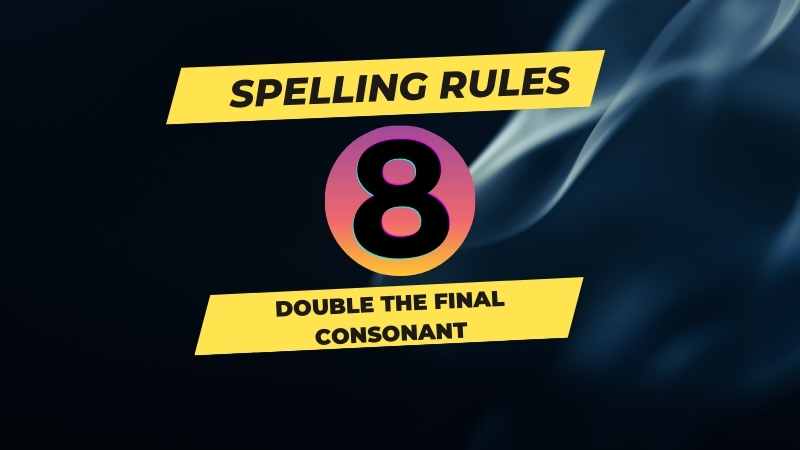Spelling rule-8:The 1:1:1 doubling up rule
If a word has ONE syllable AND ONE vowel And it ends in ONE consonant, double the final consonant.
put – putting, big-bigger, stop-stopped, fat- fatten, run – running, thin – thinner, sit – sitting, get – getting, stop-stopping, hot-hotter, swim – swimming, shop – shopper.
8.1: Do you know when we double up the last consonant?
Say these words to yourself: put/sit/run/swim/thin/get.
Notice they all have 1 syllable.
Notice they all have 1 consonant at the end of the word.
Notice they all have 1 vowel next to the consonant: vowel + consonant
8.2: With the 1:1:1 rule we usually double the end consonant when we add the following vowel suffixes (-ing,-ed,-er, -est, -en, -ish, -ery, -y).
8.3: The reason why we double up the consonant is to keep the short vowel sound.
8.4: Let’s look at why knowing all about the magic ‘e’, silent ‘e,’ drop the ‘e’ rule and the doubling up rule is important.
Look at these pairs of words:
Read them out loud – when you read them you should be able to distinguish between the short vowel and the long vowel sound. (Remember we double up to distinguish a short vowel)
hoping and hopping
hoped and hopped
rating and ratting
rated and ratted
taping and tapping
taped and tapped
hoping = hope + ing (drop the ‘e’) hoping (long sound)
hoping = hop + ing (double the p) = hopping (short sound)
rating = rate + ing (drop the ‘e’) = rating (long sound)
ratting = rat + ing (double t) = ratting
taping = tape + ing (drop the ‘e’) = taping (long sound)
tapping = tap + ing (double up ) = tapping
8.5: Let’s look at the confusion with write, writing, written
write to writing = write + drop the ‘e’ with -ing = writing write to written
The magic ‘e’ silent ‘e’ makes the i in write a long vowel sound but when we double up the ‘t’ it makes the i a short vowel sound.
Lots of people mistakenly double up the t in writing (writting x) maybe because of written
So we double up the final consonant when words have one syllable ending in one vowel + one consonant and it makes the vowel sound short.
8.6: But we never double up the final consonant when it’s c, w, x, v, u, or y.
8.7: The 1:1:1 doubling up rule is also used for longer words.(The RABBIT rule)
Notice the second syllable is stressed and you can hear a clear short vowel sound
begin (beGIN) – beginner, beginning
forget (forGET) – forgetting, forgettable
regret (reGRET) – regrettable, regretting, regretted
forbid – forbidden
submit – submitting, submitted,
upset – upsetting
expel – expelled, expelling
equip – equipped. equipping
acquit – acquitted, acquitting, acquittal
admit – admitting, admittance, admitted.
8.8: We also double up the r in:
prefer – preferred, preferring ( BUT NOT preference, preferable, preferential)
refer – referred, referring, (BUT NOT reference, referendum, referential)
defer – deferred, deferring (BUT NOT deference, deferent, deferential)
occur – occurring, occurred, occurrence.
8.9: When the stress doesn’t fall on the final syllable don’t double up:
budget – budgeting, budgeted
murmur murmuring, murmuring
cater catering catered
perform – performer performing ( the second syllable is stressed) but it’s a long vowel sound with -or- before the m.
8.10: Focus can be spelled with either a single or a double s
focused / focussed
focusing / focussing
Spelling Rules
Spelling Rule- Before You Start: Part-A
Spelling Rule- 1: Syllables
Spelling Rule- 2 : English Words Never end with
Spelling Rule- 3 : “Y” acts as a consonant as well as a vowel
Spelling Rule- 4 : Two sounds of “C”
Spelling Rule- 5 : Two sounds of “G”
Spelling Rule- 6 : Magic-E/Silent-E
Spelling Rule- 7 : Drop the “e” rule
Spelling Rule-8: The 1:1:1 doubling-up rule
Spelling Rule-9: A E O U at the end of the Syllable
Spelling Rule-10: The Rabbit rule
Spelling Rule- Before You Start: Part-A
Spelling Rule- 11: The FLOSS/FLSZ rule
Spelling Rule- 12 : Use of C or K to pronounce K
Spelling Rule- 13: Use of /CH/ & /TCH/
Spelling Rule- 14: Use of /Cial/ & /Tial/
Spelling Rule-15: Two vowel’s sounds
Spelling Rule- 16 : Short Vowel Sounds
Spelling Rule- 17 : Long Vowel Sounds
Spelling Rule-18: Vowels in Short Words
Spelling Rule-19: Long Vowels’ Rules and Patterns
Spelling Rule-20: W is the Boss

